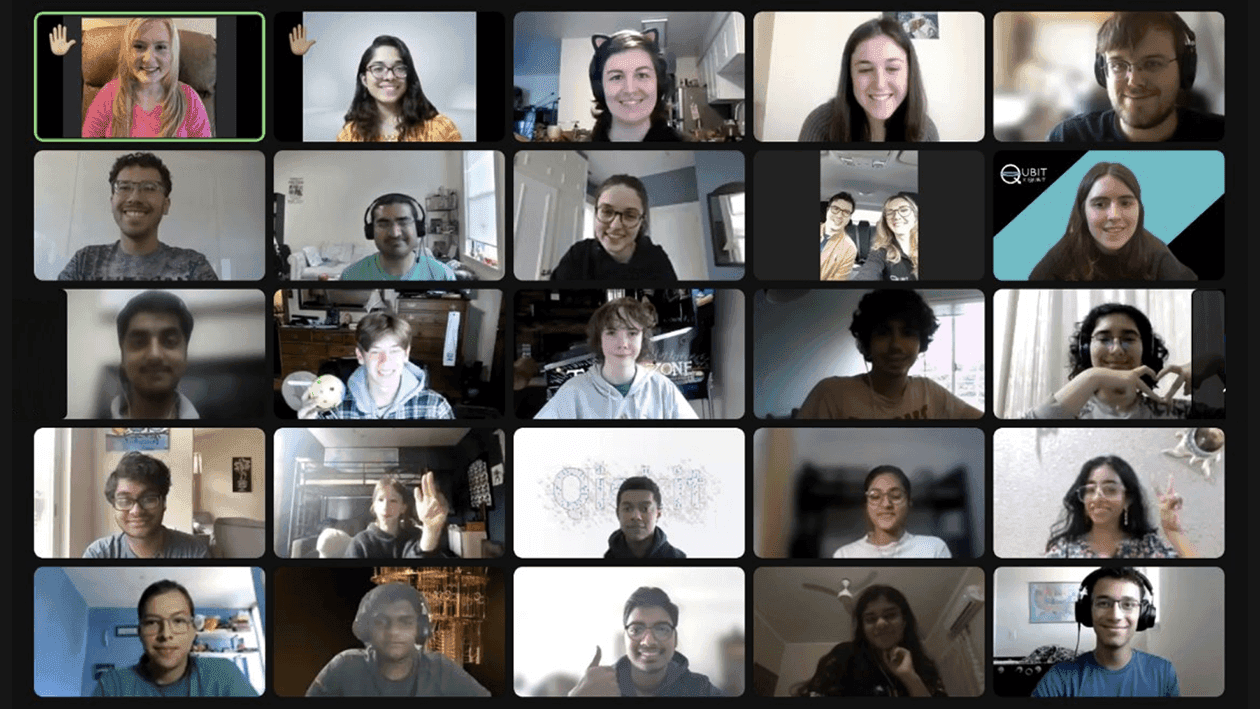Qubit by Qubit is accepting interest for next year’s course. To be notified when applications open, please complete this interest form.
For the past two years, thousands of high school students around the world have had the chance to learn about superposition, entanglement, coding in Qiskit, and applications of quantum computing. And now, their coursework is paying off, as those students begin to attend college and join the quantum workforce.
These students are helping to grow a global, diverse quantum ecosystem thanks to a partnership between IBM Quantum and Qubit by Qubit, an initiative of The Coding School focused on training the future diverse quantum workforce.
This is the second time IBM Quantum and Qubit by Qubit have partnered to offer this comprehensive Introduction to Quantum Computing course, accessible to students with only geometry as a prerequisite. In the past two years, they’ve introduced nearly 10,000 students to quantum computing through these courses, with more than half coming from backgrounds traditionally underrepresented in STEM.
In order to build the best quantum ecosystem of tomorrow, we need to democratize quantum education and remove any roadblocks preventing students from learning quantum computing. We think that the Qubit by Qubit course can help play a key role there.
For some high school students, this year’s course was an opportunity to hone an interdisciplinary array of STEM skills, including linear algebra, coding in Python, physics and engineering. For others, especially high school juniors and seniors, this course allowed them to explore new career paths and helped them discover what they want to study in college. Many students are eager to continue learning about quantum computing after completing the course, and some have even been inspired to pursue careers in the field.
For example, Salena, a senior in North Carolina, took the course after hearing about it through her participation in ChickTech, a nonprofit focused on connecting women with the tech industry. She recently received a full-ride scholarship to North Carolina State’s College of Engineering where she’s looking forward to getting involved with the IBM Quantum Hub when she gets to campus.
“I love challenging myself, and this course definitely helped me feel challenged and combined my other interests in math, engineering, and coding,” she said. “I had a great time learning all the different aspects of quantum, seeing quantum labs, and learning about how others got their interest in quantum.” Salena will be studying Electrical and Computer Engineering while doing undergraduate research in Nano-Robotics. After learning quantum through the course, she’s eager to add a class, club, research, or possibly a minor in Quantum Computing or Quantum Mechanics.
Bryan, a high school senior, enrolled in the course through his high school in Arkansas in hopes of finding his passion. After successfully completing the course, Bryan had his mind made up: “I started my senior year in high school not knowing what I wanted to do in college or where I wanted to go, but because of this class, things changed. After taking this class, I have decided to major in computational physics,” he said. Bryan will spend his summer doing research in a quantum lab at the University of Arkansas through another Qubit by Qubit program, and will begin his studies as a freshman at the university in the fall.
With over 100 high school partners, QxQ’s quantum course is a fundamentally different education model that provides schools access to some of the nation’s top quantum experts and researchers through a live, virtual course. Jackie Corricelli, Pre K-12 Computer Science Curriculum Specialist for the West Hartford Public School District in Connecticut, attests to the significance of the course. “The number one thing I have received from QxQ is that quantum computing should be introduced in high school curriculum,” she said. “Quantum computing should not be elite understanding, reserved for only computer science grad students. Key concepts are possible for high school students to grasp. That foundational understanding should provide a perspective that will benefit them (and us) in our shared futures.”
In the last few weeks of the course, hundreds of students created projects to apply their newfound knowledge. Some students explored applications of quantum computing in fields they care about, like medicine and climate change. Others advocated for policy changes at their school and even internationally that will support the growing quantum ecosystem, like international governance protocols for quantum cryptography. A Texas high school senior, Lamech, wrote to his district superintendent to encourage school leaders to bring quantum education to their schools.
Finally, Tanek, a Virginia high school sophomore, took advantage of the projects to teach himself another IBM Quantum tool - Qiskit Pulse. He developed a project using Pulse to explore coherence rates in superconducting qubits.
It’s our hope that the high school students we introduce to quantum computing today will be the innovators who unlock the next big discovery tomorrow. These students are the future of the field.
Qubit by Qubit is already accepting interest for next year’s course, which will run from September 2022 to April 2023. To be notified when the application opens, please complete this short interest form.
Learn more about:
Quantum Community: The Qiskit open-source SDK is the leading platform for quantum development worldwide, and its active quantum developer community is the largest in the world.
Cryptography: Cryptography enables the private, authenticated, and confidential communication that allows the internet to thrive. We’re researching quantum-safe cryptography, zero-knowledge proofs, and lattice-based cryptography.




